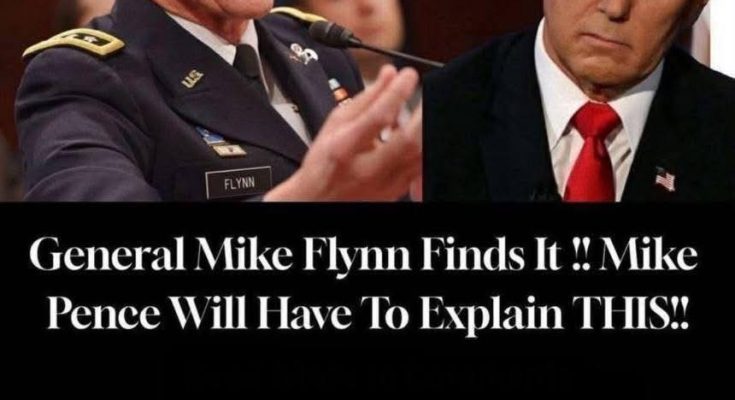In the latest twist to the long-running controversy surrounding the “Russiagate” investigations, retired Lt. Gen. Michael Flynn — former national security adviser to President Donald Trump — has called for federal authorities to raid the Washington, D.C. mansion of former President Barack Obama. Flynn, who was himself a central figure in the investigations into alleged Russian interference in the 2016 election, has increasingly positioned himself as a vocal critic of what he views as a coordinated effort to undermine Trump’s presidency.
During an appearance on a podcast hosted by commentator Benny Johnson, Flynn argued that the Department of Justice should subject Obama to the same kind of investigative scrutiny that Trump faced when federal agents executed a search warrant at his Mar-a-Lago estate in Florida.
“Just as was done to President Trump when they raided his home at Mar-a-Lago … I do think that what the DOJ should be considering, if not getting ready to conduct, is a raid of Barack Obama’s home up there at Kalorama in Washington, D.C.,” Flynn said.
The retired general went further, suggesting that Obama continues to exert influence over Democratic leadership and the White House from behind the scenes.
“The former president is essentially managing Joe Biden’s White House from his own residence,” Flynn alleged. “Those are things that need to be considered right now.”
Flynn’s Argument
Flynn’s remarks reflect his broader belief that federal institutions, including intelligence agencies and the Justice Department, were weaponized to damage Trump’s presidency from its inception. He has long argued that senior officials exaggerated or fabricated connections between Trump’s campaign and Russia.
By calling for a raid, Flynn was drawing a direct parallel between the treatment of Trump and the lack of investigative scrutiny, in his view, toward Obama and other high-level Democratic officials.
He further insisted that law enforcement should move quickly, suggesting the formation of a specialized task force and the appointment of a dedicated prosecutor to investigate what he describes as a coordinated conspiracy.
“There should, at a minimum, be a task force assembled of federal law enforcement authorities, as well as an assigned, dedicated prosecutor at the DOJ level … Someone who is working directly for the attorney general and for the president of the United States. This has got to happen very quickly,” Flynn declared.
Broader Political Support
Flynn’s comments echo sentiments expressed by several Republican lawmakers who argue that misconduct during the 2016 election and Trump’s first term has never been fully addressed.
On Fox News’ Sunday Morning Futures, Rep. Anna Paulina Luna (R-Fla.) cited what she sees as evidence of criminal behavior by intelligence and government officials during the Russiagate era. Luna referred to comments made by Director of National Intelligence Tulsi Gabbard, who recently characterized the actions of some officials as a “treasonous conspiracy.”
“There needs to be criminal prosecution and arrests. Lying under oath, putting out a false intelligence report — that’s a violation of 18 U.S. Code 1001,” Luna said, pointing to the statute that criminalizes knowingly making false statements to the federal government.
Rep. Byron Donalds (R-Fla.), who is currently preparing for a gubernatorial run in 2026, joined Luna in calling for accountability.
“There need to be arrests on this matter. People need to go to jail on this because this is about the republic. This is not about one president — it is about the presidency and the continuation of our country,” Donalds said.
A Familiar Flashpoint
The renewed calls for accountability highlight how the Russiagate investigations — though years old — remain a potent political issue in U.S. politics.
The controversy began in 2016 when U.S. intelligence agencies concluded that Russia had interfered in the presidential election to benefit Trump’s candidacy. Investigations, including the high-profile probe by Special Counsel Robert Mueller, examined whether Trump or his campaign had colluded with Russian operatives.
While Mueller ultimately did not find sufficient evidence to charge Trump or his campaign with conspiracy, his report documented extensive Russian efforts to influence the election and numerous contacts between Trump associates and Russian figures.
For many Republicans, however, the investigation itself has come to symbolize what they see as an entrenched political establishment willing to manipulate the justice system against outsiders like Trump.
Flynn, in particular, has personal stakes. He was forced to resign as national security adviser after just 24 days in the role amid revelations that he misled Vice President Mike Pence about his contacts with the Russian ambassador. Flynn later pleaded guilty to lying to the FBI, though he later recanted, arguing that he had been entrapped. He was eventually pardoned by Trump in 2020.
Obama’s Role in the Debate
The question of Obama’s involvement in Russiagate has long been a subject of speculation among Trump allies. Flynn and others claim that the former president oversaw or encouraged intelligence gathering against Trump’s campaign and transition team. Critics argue that such claims are largely unsubstantiated and politically motivated.
Obama has rarely addressed the issue directly, though in past remarks he defended the integrity of U.S. intelligence agencies and the necessity of investigating potential foreign interference in U.S. elections.
Flynn’s demand for a raid on Obama’s residence marks an escalation of these accusations, though no evidence has emerged publicly that would warrant such action under existing legal standards.
Legal and Political Implications
Calls for raids and arrests underscore the growing willingness of political figures to use the language of criminal justice when discussing partisan disputes. Legal experts note that accusations of “treason” or demands for raids of former presidents’ homes carry significant weight, but without concrete evidence, they remain largely symbolic political rhetoric.
The Justice Department has so far shown no indication that it intends to target Obama in connection with Russiagate. Analysts say such an action would be extraordinary and almost certainly trigger a constitutional crisis.
Still, Flynn’s remarks reflect ongoing Republican frustration with what they see as a double standard in the treatment of Trump compared to Democratic leaders. The Mar-a-Lago raid in particular has become a rallying point for Trump supporters who believe the justice system is being selectively applied.
Conclusion
General Michael Flynn’s call for a raid on former President Obama’s D.C. mansion illustrates how deeply the Russiagate saga continues to shape American politics nearly a decade after it began. While his remarks are unlikely to lead to immediate legal action, they underscore the enduring power of the narrative that Trump and his allies were unfairly targeted by entrenched political forces.
For Republicans like Flynn, Luna, and Donalds, the issue is not just about Trump but about the integrity of the presidency itself. For Democrats, the comments highlight what they see as a dangerous escalation of partisan rhetoric that undermines public trust in institutions.
Whether or not Flynn’s demands gain traction, the debate around Russiagate, accountability, and the balance of power between political parties and government agencies is certain to remain a defining feature of U.S. political discourse for years to come.

